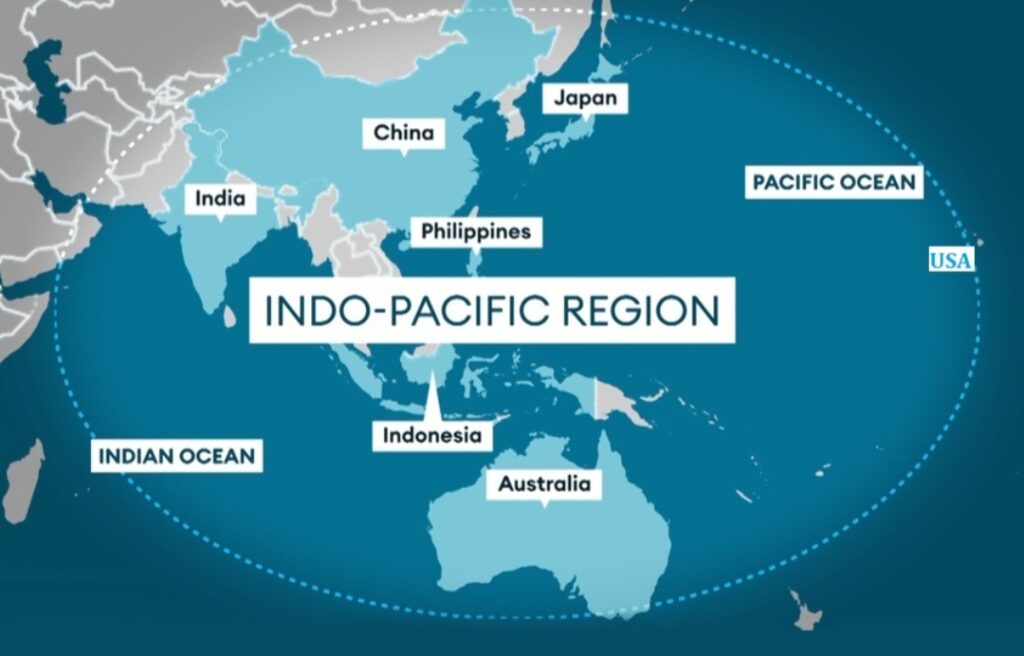By: Abhyuday Saraswat

“Free and Open Indo-Pacific (FOIP)” was the main takeaway from PM Fumio Kishida’s visit to India recently. His main purpose was to unveil his new plan on the soil of India, making it an indispensable partner in realising the FOIP. But what exactly does the Free and Open Indo-Pacific mean for Japan, and why is India a key partner in many nations’ strategies for the Indo-Pacific? Why is India seen as an ally by many?
The Indo-Pacific region is a geopolitical territory that includes the Indian and Pacific oceans. The Indo-Pacific region, which stretches from the west coast of the United States to the west coast of India, is a 24-nation regional framework that includes the tropical waters of the Indian Ocean, the western and central Pacific Oceans, and the seas connecting the two in the general area of Indonesia.
But the entire region is under threat from China and its tendency to bully its neighbours, along with North Korea’s constant aggression towards its neighbours, mostly ASEAN. As a result, the Indo-Pacific emerged as an area of importance for many nations and superpowers. With Japan focusing on FOIP, the USA and Canada have also included India in their strategic framework to counter China in the region.
Japan’s FOIP
Late Prime Minister of Japan, Shinzo Abe laid the foundation of Free and Open Indo-Pacific which was a blanket term that includes the Indo-Pacific-specific strategies of nations with comparable regional objectives. With the recent visit of Japan’s PM to India, the two leaders pledged to strengthen their relationship. Believing that doing so will help create a more peaceful, stable, and prosperous Indo-Pacific region as well as benefit the two nations in many other ways. “It is based on our mutual democratic values and respect for rule of law on international platforms,” the Indian Prime Minister Narendra Modi said.
Japan is moving forward afterrealising that the Indo-Pacific region, which is home to more than half of the world’s population, is at the core of global vitality and is essential to the world’s stability and prosperity. The “Free and Open Indo-Pacific” vision seeks to realise the prosperity of the entire area by facilitating open and vigorous economic activity throughout the Indo-Pacific. The principles for peace and norms for prosperity, handling problems in an Indo-Pacific manner, multi-layered connectivity, and expanding efforts for security and safe usage of the “sea” to the “air” are the new “four pillars” of cooperation for FOIP.
The “FOIP” Vision is being pursued by Japan through a concerted, whole-of-government strategy.
To maintain a sizeable presence in the area as the seas are a lane for multi-nation exports and trade, India’s cooperation is needed. In the Indo-Pacific, Japan is marked by performing drills and exercises of all three forces on an annual basis as well as in groupings of nations. Maitryi, Dharma Guardian, and Malabar Exercises are performed to counter the threats of the region.
PM Kishida stated that by 2030, Japan would mobilise more than $75 billion in public and private funding for infrastructure projects throughout the Indo-Pacific region and grow alongside other nations.
India in the Indo-Pacific
Countries like Australia, Japan, and the United States view India’s involvement in the Indo-Pacific region as essential. Nonetheless, despite New Delhi’s presence in the Indian Ocean, because of its continental challenges, marine security has actually stayed outside of India’s strategic interests, worries, and thoughts.
In this regard, India is taking up the policy of a multi-pronged approach, with regional problems being solved via regional groupings as well as involving the Quad in order to counter the common threat. While alliances with more powerful nations like Australia, France, Japan, and the United States have given New Delhi a broader platform to increase its diplomatic reach, its relationship with island countries will determine India’s position in the Indo-Pacific. Due to the island nations’ close proximity to India, the Maldives, Sri Lanka, and, to a greater extent, Mauritius and the Seychelles, their foreign policy decisions would directly affect the security situation in New Delhi. It is important and delicate for India not to contaminate its neighbouring areas, as the small nations in the neighbourhood can get tangled up in the Sino-Indian or Sino-US geopolitical rivalry.
India will face a tough test in juggling relations with China, the US, the EU, and other regional organisations like QUAD, BIMSTEC, and SAARC. Smaller countries in South Asia and India seem to understand the anticipated move in foreign policy from non-alignment to multi-alignment, but there are significant hazards ahead for India due to unresolved border issues and the trade deficit with China.
Chinese Influence
China’s sphere of influence in the Asia and under developed countries is notorious, with its recent Sri Lanka fiasco, it is evident that China won’t stop at anything. The BRI (Belt and Road Initiative) is aiming to build infrastructure in ASEAN and increase connectivity, but its recent rise is being seen with an eye of suspension because of its debt trap policy. Several groupings, states, and players are sitting on the fence and watching the play unfold.
The world economy and security depend on the Indo-Pacific area. On the one side, we have the US, which has long held a strong position. China, a fast-rising power that poses a danger to the established quo, is the opposite; it is viewed with distrust. Several nations in the Indo-Pacific are also affected by the Sino-US strategic rivalry. The world can wish for prosperous cooperation and harmonious coexistence. But an aggressive and expansionist China seems to have gone the confrontational route. China’s goal has been to reclaim its former greatness by ruling Asia now and the rest of the world later. As a result, countries in the Indo-Pacific and beyond will continue to face difficulties as a result of China’s rise. Since China deliberately seeks to overthrow the West and the established international order, it is clear that it cannot and will not rise peacefully. As a result, the West, along with India, needs to check China’s ascent in order to avoid major global repercussions. Regional organisations like QUAD, AUKUS, and other aid initiatives are being used as levers to control China.

About the Author
Abhyuday Saraswat is young Defense Research intern at The Kootneeti. He has authored other articles and pieces on India’s International and Defense relations. He is pursuing Master in Defense and Strategic Studies from Bareilly College, M.J.P. Rohilkhand University, Bareilly. Beforehand, he attained a Bachelor of Science degree in Military Science from Bareilly College. His fields of interests include Defense Affairs, International Relations and Geopolitics. His writings have appeared at The Kootneeti. The views expressed are personal.

